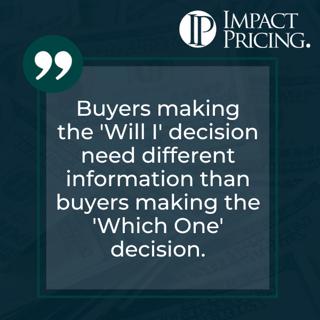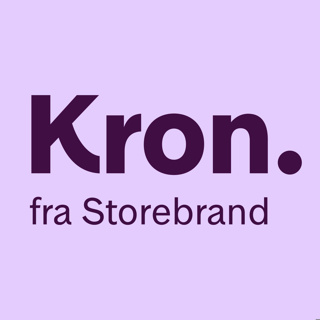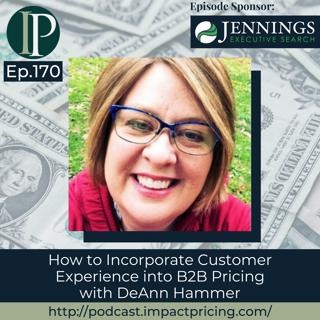
How to Incorporate Customer Experience into B2B Pricing with DeAnn Hammer
DeAnn Hammer is the Global Pricing Operations Manager at 3M, an industrial machinery manufacturing company that innovates with purpose and uses science every day to create real impact in every life around the world. She was originally a Marketing Manager in 3M. DeAnn was the valedictorian of her high school senior graduating class In this episode, DeAnn shares how she does the work of simplifying prices in a way that your customer understands as she puts emphasis on having not to negotiate once it’s properly done. Why you have to check out today’s podcast: Find out why it’s a game-changer move for you to make buying a B2C experience for clients in a world of B2B; Discover how simplifying pricing removes the need for negotiating prices in the market; and Understand how price simplification unwinds the complexity in pricing “If you make customers wait, you're going to lose the sale. Process and simplicity are going to allow you to grow your business even on really mature products.” – DeAnn Hammer Topics Covered: 01:53 – How DeAnn got into pricing; DeAnn as a market development manager 03:07 – Marketers overpricing and underpricing their products 06:34 – The difference between the roles of a pricing manager and a pricing operations manager 08:09 – Activating pricing and making it a B2C experience in a B2B world 12:36 – Houses and cars as the only things consumers negotiate for 15:15 – Unwinding the complexity in pricing through price simplification 21:00 – Determining what’s wrong with Mark’s strategy 23:34 – Having to make tradeoffs by trying to get rid of negotiated deals 25:32 – DeAnn’s piece of pricing advice for today’s listeners Key Takeaways: “You do a lot of insights work in marketing and you're gathering that information about customers’ willingness to pay, but there's also really bad questioning and marketing insights. What people tell you during insights isn't always what they mean, so you really need to pay attention to that willingness to pay and the value the product gives.” – DeAnn Hammer “Activating pricing and making it a B2C experience in a B2B world; I actually think that's how we can grow.” – DeAnn Hammer “I really think businesses have to start thinking about things that are easy, things that people understand, things that they have the data for, how can they just buy those, versus those things that are really perceived as having a much higher value in the idea that it should be negotiated. I think there's a line there about what should be negotiated and what shouldn't be.” – DeAnn Hammer “There was a time where you had to walk into a bank. There was a time you had to wait for an answer. And that's no longer the culture that we live in; we want that instant gratification.” – DeAnn Hammer “Keep it simple. Get the price out there. Let them buy it.” – DeAnn Hammer People / Resources Mentioned: 3M: https://www.3m.com/ Kelley Blue Book: https://www.kbb.com/ Carvana: https://www.carvana.com/ Connect with DeAnn Hammer: Email: dmhammer@mmm.com LinkedIn: https://www.linkedin.com/in/deann-hammer-4360a2a/ Connect with Mark Stiving: LinkedIn: https://www.linkedin.com/in/stiving/ Email: mark@impactpricing.com
25 Apr 202228min

Blogcast #51: Pricing People Shouldn’t Set Prices
This is an Impact Pricing Blog published on March 16, 2022, turned into an audio podcast so you can listen on the go. Read Full Article Here: https://impactpricing.com/blog/pricing-people-shouldnt-set-prices/ If you have any feedback, definitely send it. You can reach us at mark@impactpricing.com. Now, go make an impact. Connect with Mark Stiving: Email: mark@impactpricing.com LinkedIn: https://www.linkedin.com/in/stiving/
22 Apr 20223min
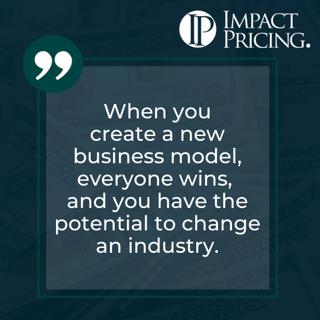
Memecast #54: New Business Models
Usually, when we think about creating a new business model, it revolves around pricing. It often revolves around, what are we going to charge for? If you think about what Netflix did when they first launched, you may recall Blockbuster was renting movies by the night, they were charging late fees. Most of their profit came from their late fees. Netflix on the other hand decided to offer a subscription where you could have one, two, or three DVDs at your house at any point in time, and you just paid a flat monthly fee. There were no late fees. What they did was changed the business model. They changed the pricing model. Now, how does this help everyone? Well, it helps everyone in the sense that now there's a group of people who prefer the subscription to the daily rental and they can go subscribe. We didn't eliminate one, although eventually, we did, but we didn't eliminate one, we just said let's offer more options to the marketplace. But in this case, especially the Netflix versus Blockbuster case, it was such a powerful thing that it really did eliminate the daily rental business. So they changed an entire industry. Take a moment. Step back. Think about how your customers really get value from your products, what they truly value, and can you change your business model to make your customers happier about the way they pay for your products? You might change your own industry. We hope you enjoyed this memecast. If you have any questions or feedback, please email me mark@impactpricing.com. Now, go make an impact. Connect with Mark Stiving: Email: mark@impactpricing.com LinkedIn: https://www.linkedin.com/in/stiving/
20 Apr 20222min
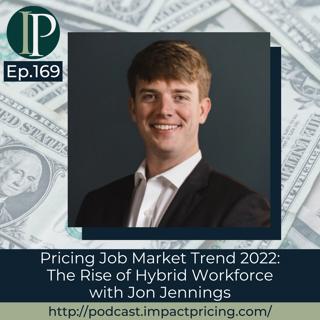
Pricing Job Market Trend 2022: The Rise of Hybrid Workforce with Jon Jennings
Jon Jennings is the Founder and Managing Partner of Jennings Executive Search, LLC. Jon is an official sponsor of this podcast. He began his career with a boutique recruiting firm, building relationships with C-Level accounting and finance professionals utilizing a research-based approach of study and analysis to best serve his clients. In 2012, Jon took this approach to a larger firm where he worked with several CFOs to build entire accounting and finance departments and gain a large firm perspective in how to build a successful practice. This experience led to the creation of Jennings Executive Search, LLC. In this episode, Jon discusses the current situation of the pricing market, specifically focusing on how things have developed since the pandemic began. Why you have to check out today’s podcast: Discover how the market has been like since the beginning of this pandemic; Learn about the difference of hybrid, in office, and at home settings, as well as how this difference influence today’s job search; and Find out why those people who are willing to learn the soft skills of pricing are the ones who are more likely to be promoted in a company “The people who get to move up are people who are adamant. They're persistent. They're not afraid to be uncomfortable in an uncomfortable conversation.” – Jon Jennings Topics Covered: 01:28 – The market’s situation since the pandemic began 04:17 – Talking about the expansion of pricing 06:01 – Everyone trying to figure out how to raise prices and putting hyper focus on it 08:49 – Are pricing people getting paid a lot more now than they were a year ago? 12:18 – Companies still not investing in pricing 14:48 – Are the requirements changing for pricing people? 18:35 – Those who are willing to learn make the biggest impact in a company 20:27 – How the difference between hybrid, in office, and at home settings influence today’s jobs 24:29 – Jon’s piece of pricing advice for today’s listeners Key Takeaways: “What's really happening in pricing has been happening for a long time, which is it's expanding; there's more jobs in pricing, and kind of separate to the current economic phenomena that we've seen over the last few years, it's been a space that's grown.” – Jon Jennings “There's a lot of openings in pricing and it's hard to find qualified people for them at the moment.” – Jon Jennings “I call it fittest athletes search. We just find the person that's most capable and learn the fastest and can just solve problems, solve business problems; they'd like to get in the business and figure things out and communicate cross functionally. Those are the traits I like to look for.” – Jon Jennings “The really good ones have a creative type of mind; not just they're good at analytics, but they have that creative side turned on and they can communicate very well. It's like yet to be everything at the same time. Those people are really impactful.” – Jon Jennings “You have to articulate the right way, that's digestible and understandable, and you got to win that meeting; and that's where you have to sell yourself, your abilities, all the time. That's really what makes you promotable.” – Jon Jennings “The way to have a big impact on your career is always selling. There's never a perfect solution; there's better and best. When you have something, be confident and don't back down. The squeaky wheel gets grease.” – Jon Jennings People / Resources Mentioned: McKinsey: https://www.mckinsey.com/ Bain: https://www.bain.com/ BCG: https://www.bcg.com/ KPMG: https://home.kpmg/ Simon Kucher: https://www.simon-kucher.com/ Connect with Jon Jennings: LinkedIn: https://www.linkedin.com/in/jonjennings/ Email: jon@jenningsexec.com Connect with Mark Stiving: LinkedIn: https://www.linkedin.com/in/stiving/ Email: mark@impactpricing.com
18 Apr 202228min

Blogcast #50: The Value of Teachers vs. Athletes
This is an Impact Pricing Blog published on March 9, 2022, turned into an audio podcast so you can listen on the go. Read Full Article Here: https://impactpricing.com/blog/the-value-of-teachers-vs-athletes/ If you have any feedback, definitely send it. You can reach us at mark@impactpricing.com. Now, go make an impact. Connect with Mark Stiving: Email: mark@impactpricing.com LinkedIn: https://www.linkedin.com/in/stiving/
15 Apr 20224min
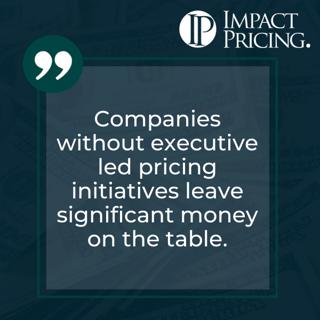
Memecast #53: Executive Led Initiatives
Let's face it, pricing people, we're typically smart. We have to interact and interface with lots and lots of different departments. But we rarely have the authority to make decisions that impact the entire company. These decisions could be changing pricing strategies, changing pricing metrics, focusing on market segments that we're going to go target. It could be getting product people to use value as they make decisions on which products to buy, or marketing people to document what value looks like as they're doing their marketing messages, teaching salespeople how to sell value. All of these are crucial when it comes to us helping the company win more deals at higher prices, but we don't have authority. What we do have is the knowledge typically to help these things happen. The only people in the company who have the authority to force these things through, to convince people who might be reluctant to say, "Yes, okay, let's go try it," are executives. If we don't have executives driving pricing initiatives, or even better yet, driving a culture of value. If our executives aren't doing this, we're leaving significant money on the table because there are lots of opportunities for us to go increase profit, we just don't have the authority. We hope you enjoyed this memecast. If you have any questions or feedback, please email me mark@impactpricing.com. Now, go make an impact. Connect with Mark Stiving: Email: mark@impactpricing.com LinkedIn: https://www.linkedin.com/in/stiving/
13 Apr 20222min
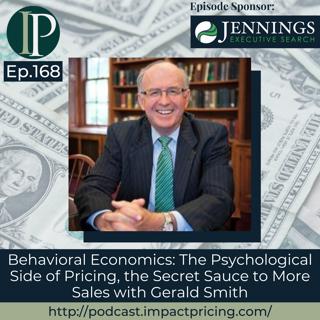
Behavioral Economics: The Psychological Side of Pricing, the Secret Sauce to More Sales with Gerald Smith
Gerald Smith is a Professor of Marketing at Boston College. He's been a Pricing Consultant with Strategic Pricing Group and Monitor Group since 1987. Gerald is the author of a relatively new book, “Getting Price Right: The Behavioral Economics of Profitable Pricing”. In this episode, Gerald discusses the power psychology holds in pricing in relation to behavioral economics as he talks about the soft side of pricing alongside the importance of framing. Why you have to check out today’s podcast: Find out what the hard side and soft side of pricing are all about, and why the behavioral side of pricing is more powerful than the logical side Understand why companies do framing, as well as why a frame of reference is important in pricing Discover why there’s power in psychology when talking about behavioral economics “Ask yourself and ask your pricing team, what do customers get and what do they pay for what they get? And say, is everybody in the industry doing it the same way?” – Gerald Smith Topics Covered: 01:39 – The start of Gerald’s pricing journey with Thomas Nagle and Reed Holden 03:08 – Gerald talks about his dissertation in relation to his new book, Getting Price Right 04:33 – The behavioral/soft side as potentially more powerful than the logical side 06:39 – The main point of Getting Price Right – the psychology of the sellers, the people that really set price 09:11 – Talking about the dominant pricing bias of salespeople giving discounts all the time 13:07 – Pricing strategy vs. pricing orientation 15:15 – Framing as one of the foundational theories of economics 18:09 – Discussion about Apple’s pricing slogan and the company having huge margins 22:45 – The power of behavioral economics – psychology; analysis vs. gut 24:12 – Talking about frame of references and setting price metrics 27:45 – Gerald’s piece of pricing advice for today’s listeners Key Takeaways: “We always think of pricing as a hard skill, as a quantitative skill. My students say to me, ‘Professor, tell me the formula for setting price.’ And I say, ‘No, no, no, folks.’ I mean, pricing is a soft skill that also brings in hard skills, for sure, so there are both skill sets.” – Gerald Smith “Sellers are also psychological and absolutely driven by psychology.” – Gerald Smith “One of the very dominant biases in pricing is that people have a tendency to discount price all the time. It's very irrational, and it, in fact, violates the principles of both psychology but especially economics, because economics says that people should rationally maximize the profits of the outcomes that are before them. And in the case of many people that apply this kind of discounting bias, they don't focus on the profits; they focus on the sales, and sales are not profits.” – Gerald Smith “Salespeople that work for somebody else are more likely to discount, but salespeople that do their own thing are less likely to discount. When they're selling their own place, they want to make sure that they maximize their profits if they can, but if they're selling for somebody else, they're happy to take that deal. That's because they get paid a commission on the deal. It is endemic to the world of pricing that people do this.” – Gerald Smith “Psychology is powerful. Analysis is terrific, but psychology is absolutely vital.” – Gerald Smith “Consumers or buyers give, but they also get. And so, if I can change what they get and what they give, then that can be very powerful.” – Gerald Smith People / Resources Mentioned: Getting Price Right: The Behavioral Economics of Profitable Pricing: https://www.amazon.com/Getting-Price-Right-Behavioral-Profitable/dp/0231190700 Freakonomics: A Rogue Economist Explores the Hidden Side of Everything: https://www.amazon.com/Freakonomics-Economist-Explores-Hidden-Everything/dp/0060731338 Connect with Gerald Smith: LinkedIn: https://www.linkedin.com/in/dr-gerald-smith-91b8383 Email: gerald.smith@bc.edu Connect with Mark Stiving: LinkedIn: https://www.linkedin.com/in/stiving/ Email: mark@impactpricing.com
11 Apr 202230min

Blogcast #49: Indirect Customer Impact
This is an Impact Pricing Blog published on March 2, 2022, turned into an audio podcast so you can listen on the go. Read Full Article Here: https://impactpricing.com/blog/indirect-customer-impact/ If you have any feedback, definitely send it. You can reach us at mark@impactpricing.com. Now, go make an impact. Connect with Mark Stiving: Email: mark@impactpricing.com LinkedIn: https://www.linkedin.com/in/stiving/
8 Apr 20223min
